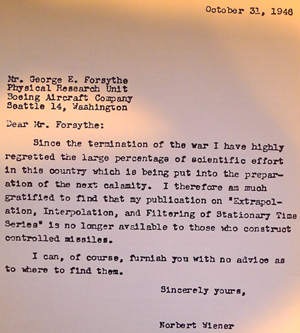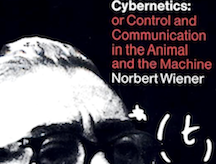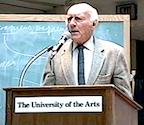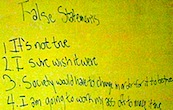I want social transformations that generate a society I desire to be an element of. Such transformations require thinking differently about: causality, purpose, emotions, control, independence and common sensical ideas we hold so near. (Mary Catherine Bateson, ASC 2014)
Cybernetics is a way of thinkng about ways of thinking, languaging, composing and preforming that speaks me rather than me it.
Cybernetic thinking opens space for anything to emerge in the domians and constraints in which we exist. (Paradigms: and the Inertia of Language)
Cybernetics -- a way of thinking about ways of thinking of which it is one. (Richards)
First cybernetics was defined in the mid 20th century by Norbert Wiener as the scientific study of control and communication in the animal and the machine. When he and others were considering the question: How can I make a machine that thinks and acts like a Human?
Cybernetics as a science focused on concepts such as organization, feedback, recursion, information, homeostasis, requisite variety, entropy, control, communication and circularity....
Throughout the 1940s and into the 60s Wiener, Ross Ashby, Warren McCulloch, Grey Walter, Gregory Bateson, Margaret Mead, to mention a few, focused on generating a transdisciplinary language relevant to both living (non-trivial) systems and non-living (trivial) systems.
Circularity a central concept in cybernetics opened a space for a new way of thinking to emerge. Self-organization. This generated an awareness of the responsibility for one's self and what one creates -- ethics.
For some this distinction was a contradiction so they left the group and created Artificial Intelligence as an alternative.

Turning from looking at to looking in generated a new cybernetics, a second c new cybernetics also known as the Cybernetics of Cyberenetics.
Cybernetics is relevant to the study of mechanical, physical, biological, social cognitive, emotional, systems and the arts. What's left?
Margret Mead triggered this shift in cybernetic language and thinking at the First ASC meeting in the late 1960s when suggesting that
I now would like to consider cybernetics as a way of looking at things and as a language for expressing what one sees. -- Margaret Mead
It was an invitation for members of this new organization to focus on its own organization by applying cybernetics concepts onto itself. To focus on the organization of organizing itself.
What struck me was her speaking about cybernetics in a cybernetical way. Thus I chose for her the title Cybernetics of Cybernetics. -- Heinz von Foerster
Cybernetics emerges when one considers economy not as an economist, biology not as a biologist, engines not as an engineer..., and in each case its theme remains the same, namely how systems regulate themselves, reproduce themselves, evolve and learn. -- Gordon Pask, 1970s
Cybernetics, one approach to solving problems when turning together, looking at our looking and wanting while paying attention to our language and doing differently.
Gertrude Stein once said, when there is communication there is no creativity. I say, when there is creativity there is anticommunication.
Herbert Brün invented the term anticommunication as a premise for designing a new and more honest language, since insistence on
Communication ultimately generates social and physical violence because communication feeds-on, speeds-up the decay of information in human systems.
Anticommunication feeds on newness and retards decay of living systems, since anticommunication ultimately insists on composition and peace as a need.
So, when I want(s) to create something new, I observe(s) an a-synchronicity, design(s) an alternative, often an anticommunication nested in communication, and ACT(s) accordingly = performance.
We are all actors acting all the time and when we act with intent performers.
Second cybernetics emerges ... and so does Artificial Intelligence.
Second order cybernetics as it was coined by HvF requires a scientist to include oneself -- as an observer in -- one's explanations. Shifting the language when making a distinction between first-cybernetics (the study of observed systems) and second- cybernetics (the study of observing systems),
Cybernetics, a transdiciplinary approach for exploring variety, in a variety of systems I look(s) -- What one sees. Including, dynamic relations and circularities, structures, processes, constraints and possibilities.
Scientist claim they are not emotional and it is not true. -- Humberto Maturana,
Cybernetics is not about generating a grand theory or ideology, It is about epistemologies, ontologies and intersubjectivity. Among other things....
Hence, third cybernetics is in the doing when including oneself in one's descriptions intentionally.
Why a third cybernetics? (Kenny)
Epistemology
Epistemology, the study of how we know and come to know what we know. How one's knowing is constructed through on one's history or herstory of knowing. For observing systems are historically dependent. (HvF)
One cannot come back to the question when is knowledge too often, and the answer knowledge is what one knows, -- Gertrude Stein
As a science, epistemology is; a) a branch of philosophy concerned with the question how is it possible to know anything and what is truth. b) studies of natural history, b1) the study of how people think they know things, b2) the study of how people know things. -- Gregory Bateson
Everybody has an epistemology or they could know anything and those who say they don't have an epistemology have a lousy one. (G.B.)
Different epistemologies entail different postures or relational attitudes that determine different domains of validity for human actions. -- Humberto Maturana
To take seriously that everything said -- everything said -- is said by an observer (an epistemology) to another observer (again an epistemology), is to revolutionize human experience. It is to hear every assertion not as 'fact' or 'truth' but as an invitation to orient in a particular manner, and no more. -- Rodney Donaldson
STILL very much contructing...
Designing Cybernetically
Cyberneitcs of cyberentics, responibility for one actions, regardless of the constraints one finds oneself emmersed in. Always doing what one wants. (Richards 2014 ASC)
Designing Desires
Premise: an art of being is doing what one wants, and in order to do what one wants one must know what one desires.
Right or Wrong MY Desires
While using the word “desire” to mean something wanted with the momentary urgency of a need and necessity, write a list of statements for which you would say:
While it is not the case, I desire it to be the case that ______.
A Desire Statement: I desire all human needs be satisfied.
Generating False Statements
In order for desires to become tools for designing one’s desires I then turn my desire statements into False Statements based in a dynamic premise that suggests: “The past is past, the present happens anyway so understanding and agreement has to be given to False Statements.
False Statement: All human needs are met.
Paradigms, Models and Premises
I like using words to describe particular phenomena so that I can build on my knowing when using certain words. I want to make the distinction between paradigm, models and premises since it helps me design a society I desire to be a part or more accurately a society I desire to be an element of (recursions).
Assumption: our language is embedded in the old paradigms for communicating. For example, the sun still sets and the moon risesin our languge even though we know that is not the case. Even though we know the heliocentric model replaced the geocentric paradigm a thousand plus years ago the language of the old paradigm haunts our epistemologies and our worldviews.
So in order for social transformations to emerge anything that is not the case may be a more valuable a statement then anything said about what is the case, since “what,” usually reflects old paradigms, models, premises and assumptions from the past rather than a present or future.
Old Paradigms Die Hard
A reward-oriented hierarchy guides our language, languaging, communications in ways that maintains the way things are a status quo that prevents “social” transformations I desire.
Reward-oriented hierarchy: needs are met when appropriate actions are achieved = status an element of a system for stratification. Stable hiearchies of power, nature and beliefs.
Longing for Links
Longing for Links which favors change over stability, yet insist that these changes be non violent and NOT improvised BUT composed in search of changing forms. (H.B.)
Composing, Triadic Relations and Performance
When might the power of a respondent, powerful images and the responsibilities of a designer generate triadic relations? (Enslin, Eglash, Richards, von Foerster)
When does the power of a respondent, powerful images and the responsibilities of a designer generate triadic relations? (Enslin, Eglash, Richards, von Foerster)
Avoidance
jManagment, Self-Interest, Self-Organization
|














